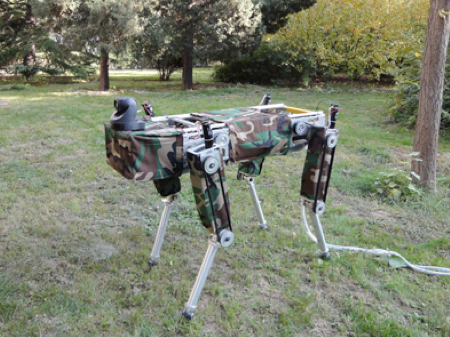Is this China's answer to BigDog?
Not quite. This is FROG, or Four-legged Robot for Optimal Gait, a quadruped developed by Dr. Wei Wang's team at the Institute of Automation, part of the Chinese Academy of Sciences, in Beijing.
FROG is a research platform that Dr. Wang and his PhD students use to develop and test quadruped gait control, gait transition, and other locomotion algorithms. Unlike Boston Dynamics' BigDog, which can walk at a fast pace alongside humans, FROG is a slower-moving machine, a prototype for what Dr. Wang hopes will be the endoskeleton of a robotic triceratops.
"I hope it can find entertainment applications in dinosaur museums or expos," he tells me.
FROG-I, the group's first version, is about 1 meter tall, weighs in at 55 kilograms, and uses DC motors. Each leg has two motors, one on the hip and another on the knee -- so 8 actuated degrees of freedom in total. The robot also has one passive compliant prismatic DOF at each toe. Sensing devices include joint angle sensors, 3-axis acceleration sensor, 3-axis gyro sensor, foot-ground contact sensors, and ultrasonic sensors. The robot also carries a pan-tilt camera.
An on-board computer running real-time Linux performs sensing and actuator control, and communicates with a host computer through a wireless connection. The control mode relies on position control and current control. Power comes through a tether.
I ask Dr. Wang if he plans to make the robot capable of moving faster -- and then perhaps challenge BigDog for a race?
"BigDog is marvelous," he says. "BigDog is hydraulic and our robot uses DC motors -- I don't think our robot could have so high capabilities."
But he adds that this is "only preliminary research" and his group plans to improve FROG if they have enough resources in the future. So who knows -- maybe Dr. Wang's daughter will ask him to build a Velociraptor next time?
Images and video: Institute of Automation/Chinese Academy of Sciences
Erico Guizzo is the Director of Digital Innovation at IEEE Spectrum, and cofounder of the IEEE Robots Guide, an award-winning interactive site about robotics. He oversees the operation, integration, and new feature development for all digital properties and platforms, including the Spectrum website, newsletters, CMS, editorial workflow systems, and analytics and AI tools. An IEEE Member, he is an electrical engineer by training and has a master’s degree in science writing from MIT.
